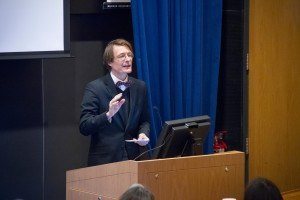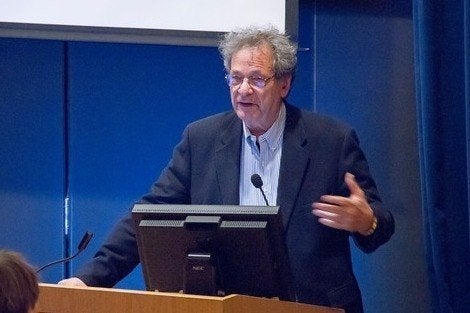March 29, 2013 — When Arnold Epstein meets Harvard School of Public Health (HSPH) alumni on his frequent travels in the U.S. and abroad, he’s often asked about [[Marc Roberts]], professor of political economy emeritus. “They always want to know how Marc is, and they always want to tell me anecdotes about how he had a really important impact on what they took away from the School of Public Health. In many ways, he is the human face of HSPH,” Epstein told a packed audience March 7, 2013, in Kresge G2.
Epstein, chair, Department of Health Policy and Management and John H. Foster Professor of Health Policy and Management, organized the symposium and retirement celebration at which faculty, students, and others paid tribute to Roberts for 46 years of service to Harvard. “I want to congratulate Marc for a really wonderful ‘tour of duty,’ Epstein said. “It’s quite a legacy.”

At Harvard Roberts has taught economics, statistics, ethics, management, environmental policy and health policy at Harvard’s Faculty of the Arts and Sciences, Harvard Kennedy School, Harvard Law School, and for the last 30 years, at HSPH. In what he calls his “quasi-retirement,” Roberts continues to play a leading role in the World Bank’s training efforts on health sector reform around the world, having taught courses and seminars for senior government leaders in nearly 30 countries on every continent except Antarctica. In the U.S. he remains an active consultant, helping organizations adjust to changing market conditions.
Roberts is also working on new books on the ethics of disaster management and on the ethics of pricing biotech drugs. His most recent work, written with three HSPH co-authors, is a popular handbook now in paperback on health sector reform, Getting Health Reform Right (Oxford University Press, 2008).
“I’ve been at home [at HSPH] here for a long time. A lot of people in this room have contributed to my work,” Roberts said in his heartfelt remarks. “I want to thank all of you for making it possible for me to do what I like.”

Among those influenced by Roberts was the symposium’s featured speaker [[Karl Lauterbach]], MPH ’90, SM ’92, SD ’95, a former student, colleague, and teacher of Roberts’ and now adjunct professor of the Department of Health Policy and Management at HSPH. Lauterbach is an elected member of the Deutsche Bundestag (a legislative branch of the German government) and professor of health economics and clinical epidemiology at the University of Cologne.
In his talk, “What Makes for an Equitable Health Care System?—Lessons from Germany,” Lauterbach discussed his efforts to increase government awareness of inequities in Germany’s two-tier health system. Ninety percent of the people receive basic care under public insurance, while 10 percent of citizens (mostly wealthier individuals and government workers) have private health insurance with increased access to specialists, medicines, and new procedures. Lauterbach noted that he observed surgeons spending considerable time on simple cases involving the privately insured system, where physicians were better paid, while less experienced doctors in the publically funded insurance program, who were lower compensated, often took on more difficult cases. By urging German officials to imagine how the overall health system could be improved if physicians in the public sector were better paid and other fixes made to the public insurance system, he slowly convinced officials to begin phasing out private health insurance.
“A lot of what I currently do is inspired by Marc,” Lauterbach told the audience. “I have had many brilliant teachers. The best teacher of all teachers I’ve had is Marc. There is no one I have learned more from than him,” he said. “We did not always agree on all issues, but he taught me how to think, not what to think.”
Click here to view a webcast of Marc Robert’s HSPH retirement celebration.
